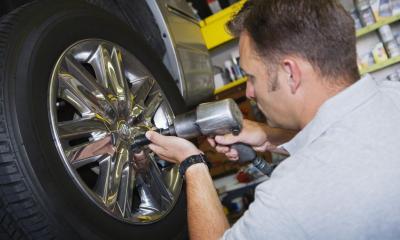
The tyre-fitting market is very competitive and independents need to offer a quality service to compete against the national fast-fit chains. Our practical guide will help you start up and run your own tyre-fitting business.
- Research your target market
- Why will people choose your business
- Niche markets
- Pricing policy
- Promote your business
- Buy an existing business
Research your target market
When you plan your tyre-fitting business it's important to make an accurate assessment of the amount of potential demand and the extent of existing competition.
Estimating demand
There is a large market for tyres and other replacement vehicle parts such as exhausts, brake pads and shock absorbers. It is estimated that well over 130,000 tyres are replaced on cars, vans and lorries every day in Britain. However, the industry is very competitive, and tyres are available from many different outlets and even online. The UK has around 3,000 specialist tyre-fitting outlets according to the Tyre Industry Federation, and another 20,000 or so garages also sell and fit tyres along with doing other repair and servicing work. So even though the overall market is large, you need to find out whether there will be sufficient demand for a new tyre-fitting business in your area.
This will depend on factors such as the size of the local population and the number of cars in your area, as well as the level of competition.
Your market
Many of your customers are likely to be private motorists buying replacement car tyres. You might also get business from local taxi firms, car dealers and driving schools. Depending on your location and the tyres you decide to offer, other customers might include motorcyclists, farmers and motor racing enthusiasts. If you offer a mobile fitting service for commercial vehicle tyres, this too can be a good source of work.
Check out the competition
In towns and cities it is likely that your main competition will come from the big fast-fit chains such as ATS Euromaster, Kwik-Fit, Halfords Autocentres, and National Tyres and AutoCare. You may also face competition from:
- other independent tyre-fitting outlets
- small local and regional chains like Protyre
- mobile-only fitting services with no outlet
- local franchised motor dealers, some of which have their own fast-fit operations and most of which sell tyres
- second-hand car dealers
- general repair garages
- breakers yards (offering part-worn tyres)
Check online to find out how many of these businesses are already selling and fitting tyres in your area. Have a look at the services offered by each of these competitors to establish:
- whether they replace exhausts, shock absorbers, brakes etc
- what prices they charge
- if they are part of a quality standards scheme
- whether they offer a mobile fitting service
- whether they specialise in certain types of tyre (such as off-road, motorcycle or commercial vehicle tyres)
- what their opening hours are
- what type of customers they attract
- how knowledgeable and helpful their staff are
- whether the premises and fittings are modern and smart
Consider carefully how your new business would compete with the existing outlets.
Bear in mind that tyre-fitting specialists also face strong competition from online retailers such as Black Circles, Mytyres and TyreLeader. Asda also sells tyres online. Online tyre retailers like these generally advertise highly competitive prices and offer a local fitting service through a network of affiliated fitters, which are often independent repair garages. Becoming affiliated to an online tyre retailer might be one way of reducing the effects of competition from this source.
Research current trends, plus legal and tax issues
Insurance for a tyre fitter
When you start up in business you will need insurance cover. Contact an insurer and explain how your business will operate. They will then recommend what cover you should have, which might include:
- employer's liability
- public liability
- product liability
- motor trader's insurance, to cover you and your staff when you're driving customer's vehicles - and to cover customers' vehicles when they're on your premises
- premises, premises contents and stock
- cash
- business interruption
- motor insurance (for parts collecting vehicles, mobile tyre fitting van)
The National Tyre Distributors Association (NTDA) has negotiated special rates on business insurance for its members.
Why will people choose your business
You need to make sure that enough people will use your business for it to be profitable. The best way to attract customers will depend to a certain extent on the nature of your location. In towns and cities, your main task will be to persuade people to use your business rather than buying their tyres elsewhere.
A lot of your work is likely to be the replacement of standard size car tyres and many people will simply look for the cheapest they can find. Some will phone around and some will look online. Competing with the prices charged by the large national fast-fit chains and online specialists can be difficult, but you should try to ensure that your prices are at least broadly competitive with others operating nearby. Bear in mind that it is very easy for motorists to search online and find out what sort of prices they should be paying for a particular tyre - and to find some very competitive prices.
Price is not everything, though, and potential customers will also consider factors such as convenience and accessibility, availability of parking, the level of service offered, your reputation, the quality of the tyres you sell and how quickly you can get any specialist tyres they might need. Concentrating on these aspects will help your business to compete.
In smaller towns and rural areas, local competition may be less of a problem than simply finding enough customers. Standard car tyres will be in demand, but offering specialist tyres may be necessary in order to increase your sales. For example, you might consider supplying tyres for agricultural vehicles, four wheel drive vehicles and quad bikes. Carrying out other replacement work (such as exhausts, suspension and brakes) and offering general servicing and oil changes may be essential if you are going to get enough work.
Convenience
Ideally, a tyre-fitting business will be located on or close to a main road, both for the convenience of customers and to attract passing trade. This might not be possible, but there other things you can do to increase the convenience of your service. For example, offering a mobile fitting service (fitting tyres at a customer's workplace or home) may attract additional work. An emergency call out or vehicle recovery service can also be handy for customers who only find out that their spare tyre is flat when they get a puncture, or whose car is stranded for any other reason. Offering other services such as oil changes, replacing exhausts, brakes and suspension components may also attract customers.
Standards of service
Wherever you are based and regardless of the range of tyres or other spares you offer, be sure to emphasise the quality of your services. Joining a trade association quality scheme will demonstrate that your business is run to a high standard and help to inspire confidence in potential customers. The National Tyre Distributors Association (NTDA) operates a code of practice for its members as well as an approved repairer scheme. Similarly, a friendly and knowledgeable approach will inspire confidence in potential customers.
Bear in mind that female motorists account for a significant percentage of your potential customers. Ask yourself whether they would be likely to feel comfortable coming into your workshop on their own to buy tyres. Points to consider include:
- the general appearance of your premises
- the attitude and attentiveness of fitting staff
- whether there is a warm, clean and comfortable waiting area
- whether customers with limited knowledge of mechanical matters feel confident they will get straightforward and honest advice
You could consider signing up to the Foxy Choice Lady Approved Garage scheme to demonstrate your female-friendly credentials.
It's not just female motorists who may be put off by an untidy workshop - many other would-be customers and particularly older people may be put off too.
Quality of tyres
Remember that all tyres supplied for road use must comply with certain standards (including retreaded and part worn tyres). Within these standards there is a huge range of tyres of varying quality, cost and specifications. Try to offer a range of tyres to suit all tastes and budgets - some people will be happy with cheap tyres, while others are more concerned about a tyre's performance than it's cost. In all cases though, people will want to be sure that they are getting a good quality product. If you can offer a wide range of tyres, you should be able to satisfy most customers.
Niche markets
Wherever your business is based, you could try to increase the number of potential customers by offering specialist tyres in addition to standard car tyres.
Motorcycle tyres
Sales of motorcycles and scooters remain strong and so the demand for suitable tyres has risen too. Additional equipment and training will be needed to fit motorcycle tyres, but the investment may be worthwhile in terms of the extra business brought in.
Caravan and trailer tyres
Camping and caravanning has boomed since the pandemic and membership of the Camping and Caravanning Club reached an all-time high of 350,000 in 2021. It was estimated that there were over 500,000 touring caravans in the UK in 2020, each of which has at least two tyres. Caravans don't generally clock up a huge number of miles in a year, but over the years their tyres can degrade and they will need to be replaced from time to time to make sure they're safe. The same applies to trailers. Caravan and trailer tyres are generally made in special sizes, and you'll need to offer a reasonable range if you're going to attract this type of business. You should be able to advise your customers about things like load rating, particularly for trailers with a large capacity.
Winter tyre fitting and storage
A small but growing number of motorists purchase a second set of winter tyres for use when the temperature drops. As well as stocking winter tyres, you might decide to offer a seasonal tyre storage and swap-over service for customers.
Commercial vehicle and truck tyres
The market for commercial vehicle and lorry tyres is huge but very competitive. The types of service required by lorry fleet operators include regrooving, maintenance and balancing, puncture repairs and replacement - including mobile emergency call-out services.
Industrial vehicle tyres
Fork-lift trucks and other types of vehicles used in industry often require special tyres, such as solid or foam-filled. Many of these vehicles cannot be driven on the road, so you'll need to be able to offer an on-site service.
Budget, retreaded and part-worn tyres
Offering good quality budget or retreaded tyres might gain you extra sales, particularly if you target local businesses that use a lot of tyres such as taxi firms or used car dealers. Demand from private motorists for retreaded tyres has fallen sharply in recent years, partly because of competition from budget priced tyres and a largely unjustified poor image. Retreaded tyres have been manufactured to the requirements of a British Standard for many years and in 2004 two EC Regulations relating to retreaded tyres were introduced in the UK.
Retreaded tyres are an environmentally sound choice, as they minimise waste and the use of raw materials. Increasing awareness of environmental issues and the benefits of recycling tyres might help to raise demand in the future.
You could also stock part-worn tyres as another option for budget-conscious motorists. Part-worns are generally sourced from countries like Germany which have more stringent laws about replacing tyres than the UK. They can offer motorists the chance to buy a high-quality top-brand tyre with plenty of life left in it at around half the normal new price or less. You'll need to check them all carefully though to make sure they are safe and undamaged, and you must meet the strict safety criteria required by law. Part-worn tyres may cease to be an option in the future if legislation changes.
Competition tyres
You could try targeting local motor clubs whose members will require competition tyres. Retreaded competition tyres (made with a soft compound to give good grip) are popular, as are part worn tyres. Sprints, track days, hill climbs and rallying take a huge toll on tyres; depending on conditions, competitors may need a complete new set after two or three events. Getting involved with local motor sport clubs can therefore lead to significant extra sales. You might try sponsoring a local sprint or rally series, perhaps offering a set of tyres for the series winner. Alternatively, you could offer club members a discount on competition tyres. Having a large van with fitting equipment will enable you to take a selection of tyres to events to sell to competitors there and then.
Vintage and classic tyres
Owners of vintage and classic vehicles have particular tyre requirements. They will need special sizes of tyre and will want to ensure that the tyres they fit are authentic and appropriate to the age of the vehicle. They will often be looking for crossply tyres and classic period styling.
Agricultural tyres
Despite recent difficulties faced by the farming industry, there is still a large market for agricultural tyres. In rural areas, tractors, machinery, four wheel drive cars and quad bikes will all need special tyres. Try tapping into the market by letting local farmers and farm suppliers know that you can supply and fit the tyres they need. Tyre fitters who deal in agricultural tyres usually visit at the farmer's request to discuss requirements, before ordering the appropriate tyre from a wholesaler or manufacturer. Agricultural tyres come in such a huge range of sizes and applications that holding them in stock is impractical.
Earthmover tyres
Civil engineering plant and machinery such as earth movers requires specialist tyres and fitting services. Special tyre handling equipment and skills are needed for these very large tyres, and services that are likely to be required include on-site fitting, repairs and re-seating, and re-treading.
Pricing policy
When you think about your pricing policy, remember that you must be able to cover all your costs, overheads and drawings and still make a reasonable profit.
How will you set your prices
Tyre bills are usually itemised, with the cost of tyres (or exhausts) listed together any additional charges for things like wheel balancing, valves and steering alignment. A additional charge is often made towards the disposal costs of the old tyres. You'll need to decide how much to charge for each of these items. Be aware though that many customers will want to be quoted an inclusive price for fitting - the price they actually pay - with no hidden extras.
Tyres and other parts
The charge to a customer for tyres or other parts is usually the cost price of the parts increased by a certain amount - this is your gross profit margin. In the case of tyres, margins are often slim, and heavy competition may force you to set you prices in line with those charged elsewhere locally. You may regularly have to match or undercut your competitors' prices if you want to win customers.
Labour
If you carry out jobs other than fitting tyres (for example servicing) you might make a charge for labour. The amount will depend on how long it takes to do the job and the set rate charged per hour. Hourly rates vary considerably - you could check out the local competition to see what rates are charged in your area.
A separate labour charge is not generally made for fitting tyres and exhausts - the fitting is usually included in the price charged for the tyre. However, an additional charge is often made for wheel balancing or steering alignment.
If you sign up as an affiliated fitter for an online tyre retailer then you'll probably agree a standard rate with them for fitting tyres sold through their website.
Other services
Think about how you will cost any other services you provide (like a recovery service or the call out charge for a mobile fitting service), how often you will review your prices and whether you will offer discounts (perhaps reduced rates to trade customers) or special offers.
Special offers and discounts
You may well offer a discount as a matter of course to any fleet and trade customers. How much discount will depend on your pricing policy and the level of local competition.
Many businesses also give discounts to employees, regular customers, family and friends. A reduced rate could be offered to groups such as pensioners or members of a motoring club. Perhaps you will offer special discount codes and vouchers through your website and/or social media. Check out the local opposition for ideas and keep a close eye on any special offers you do make to be sure that they are working for you. After all, these kinds of promotions might encourage extra business, but they will also affect the amount of profit you make on each job.
Promote your business
It's very important to ensure that your business projects the right image and that it maintains consistently high standards. And it's vital to let would-be customers know about your business and its selling points.
The right image
People's first impression of your business will be influenced by the way it looks - so it is vital to project the right image. Try to keep your premises clean and tidy and, if necessary, consider re-painting to brighten things up. Use signs to indicate what services you offer. If possible, have a separate reception/waiting area, where you can talk to customers and they can sit whilst their car is being worked on. Provide some leaflets or posters about tyres and tyre safety and consider installing a hot drinks machine.
Ask yourself objectively if all customers are made to feel equally welcome and comfortable coming into your garage. Make sure all of your fitters understand what you expect of them in terms of conduct and professionalism. If you fail to attract specific groups of motorists then you're unnecessarily limiting the size of your potential customer base. You could consider signing up to the Foxy Lady Approved Garage scheme to demonstrate your female-friendly credentials.
If you operate a mobile tyre fitting or a vehicle recovery service, bear in mind that the van or tow truck will be a highly visible advertisement for your business. It doesn't need to be new, but it should look smart, clean and well maintained.
Good service
Just as important as appearance is the attitude shown to customers. People too often associate garages with poor service and a somewhat off-hand or patronising manner. Treating customers in a friendly, helpful and polite way will help to create a good impression.
Be prepared to explain to people the various options they have when replacing their tyres. Many people will want the cheapest tyres (and often these will be adequate), but don't hesitate to explain the benefits of a more expensive tyre for higher performance cars, for example. Reputation can only be built over time, but from the outset you should aim to offer a high level of service and ensure customers are satisfied with the work done and the tyres or other products supplied. Finally, do your best to deal with any questions or complaints promptly and politely.
Quality standards
Joining a trade association quality scheme will demonstrate that your business is run to a high standard. Members of the National Tyre Distributors Association (NTDA) must abide by its code of practice to have the right to display the 'kneeling man and tyre' logo. The NTDA also operates an approved tyre repairer scheme.
Advertising your business
It is important that you advertise your business so that potential customers know about you, the tyres you sell and the services you offer. There are several ways to do this - for example:
- use external signs to inform and attract passing trade
- set up a Google Business Profile and advertise online to capture the attention of anyone looking for a local tyre fitter
- advertise on social media and on local online business directories
- build a website to inform your customers and allow them to make bookings
- advertise in your local newspaper and any local directories
- place leaflets at local filling stations
- contact local driving schools and taxi firms to let them know about the tyres and any other parts you offer
- offer drivers a free tyre safety check
Most people search online these days for things, so a good business website is essential. A website could let customers view prices, choose tyres and book their car in for fitting. Consider using social media, forums and blogs to promote your business online too. You could also use online business directories.
Buy an existing business
You might decide to buy an existing tyre-fitting business rather than start your own venture from scratch. Buying a going concern can mean that the products, customers, regular sales, staff, premises and equipment are already in place.
Buying a business can be a hazardous, expensive process unless you have the right skills and experience on your team, including legal and financial know-how. Establish the genuine trading and financial position, so that the price you pay for the business is not too high. Make sure that you're not going to become the proud owner of a large and costly-to-deal-with stockpile of used tyres!
Franchises
Franchising can be a good 'halfway house' between starting out from scratch and buying an existing business. If you purchase a franchise you'll still be setting up your own business, but you could benefit from the experience, resources and brand name of a business that is already successful.
There are several franchise opportunities available in the tyre-fitting industry - particularly for mobile tyre services. Although different schemes vary in detail, most feature the following key points:
- as a franchise holder, you will remain self-employed but will use the identity (corporate colours, logos, trade name and so on) of the franchisor
- in return, you will pay the franchisor a fee - this might be a one-off investment, a monthly charge, or a combination of both
- both you and your franchisor will have to fulfil certain obligations and maintain certain minimum standards
Some franchisors will provide you with any specialist training you require, help with advertising and marketing, and advice and support on a range of business and technical matters.
Details of the above points are set out in the franchise agreement or contract, which both you and your franchisor will sign. The agreement will also deal with other matters, for example any territorial exclusivity due to you and the minimum period for which the franchise will run.
Before entering into a franchise agreement, it is advisable to compare the terms of different franchisors to be sure that you are getting a good deal. Go through the contract with your solicitor before signing anything. More information about franchising is available on the Franchise Info website. Information is also available from the British Franchise Association (BFA).



